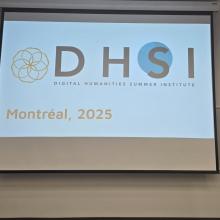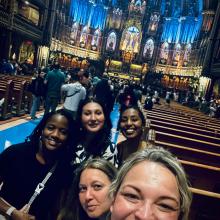
The Digital Humanities Summer Institute (DHSI) is an annual digital scholarship training institute that is organized for its community by the Centre de recherche interuniversitaire sur les humanités numériques (CRIHN) and takes place at the Université de Montréal campus.
Every summer, DHSI brings together faculty, staff, and students from the arts, humanities, library, and archives communities as well as independent scholars and participants from areas beyond. DHSI provides a community-based environment for discussing and learning about new technologies and how they influence teaching, research, creation, and preservation in different disciplines. Participants share ideas and methods as well as develop expertise in advanced technologies during this time of intensive coursework, seminars, and lectures.
Imagine a summer camp for digital humanities.
W&M Libraries provides funding for up to five faculty and graduate students to attend DHSI. This year, a few library staff attended. Content & Social Media Coordinator Sarah Thompson asked Research & Instruction Librarian Rachel Hogan, Open Publishing Specialist Kay Helm, and W&M Libraries Faculty Scholar and Professor of Gender, Sexuality, and Women's Studies Jennifer Putzi about their experience at DHSI 2025. Here is what they said:
How many times have you attended DHSI?
Rachel: This year in Montreal was my second time attending DHSI. Last year, I attended the final institute hosted in Victoria, BC, and had a wonderful time.
Kay: This was my first time attending DHSI.
Jennifer: This is my second time attending DHSI.
What were your expectations going into the program, and what were you hoping to learn?
Rachel: Having been to DHSI before, I knew a little bit of what to expect, but I figured that a lot of things would be different. I knew that the change from Victoria to Montreal and teaching a course for one week would make a significant difference. In the class that I took the first week, “Equity, Advocacy, and Care Framework for Digital Humanities Labs and Communities,” I was hoping to get some ideas about community building and to learn how care, equity, advocacy, and intersectional feminist pedagogy intersect with digital humanities work. In the class that I taught, “DH for Librarians” I was hoping to impart some of the lessons that I have learned in two years as a Digital Humanities Librarian and to also learn from the experiences of my students.
Kay: I attended the Conceptualizing and Creating a Digital Edition course. As expected, it was an opportunity to see what others are doing and to learn more about the processes and tools for creating these exhibits.
Jennifer: I took one very technical course ("Processing Your XML with the XML Family of Languages") and one project management course ("Agile Project Management"). My expectations were fulfilled for both. In the XML class, I wanted to get a basic sense of how XPATH, XSLT, and Schematron worked. The course offered far more than a basic sense, but given my level of experience going into it, I just wanted to understand what was going on! My project management class helped me rethink how I'm structuring the schedule and managing the labor for my Black Women's Diaries Project.
What was your biggest takeaway?
Rachel: My biggest takeaway was that while the landscape of DH in the US and other parts of the world is a bit uncertain right now, there is still an amazing international community of faculty, students, researchers, technology specialists, and librarians that are great for inspiration, collaboration, and support. While a lot of things have changed in the last year, there is still a lot that we can do by scaling down a little bit and leveraging our connections throughout academia.
Kay: I came away with an increased understanding of how faculty use these projects, what their needs may be, and the many resources they must coordinate to prepare materials for production. Since returning, I've incorporated what I learned into our workflow documents to better serve our faculty, and I am re-imagining what a book can be.
Jennifer: My most valuable takeaway was to create a long-term vision for my project, but also to have a handle on the smaller chunks and the day to day. Be ready to be "agile" if you need to be, to change plans without feeling like you've lost control. This helped when I got Covid this summer!

Were you able to explore Montreal while you were there?
Rachel: Yes, during my two weeks I was lucky enough that I took a class with someone who stayed in the dorm next to me and she became my partner in exploring the city. We were able to do a lot of fun things including Notre Dame Basilica, the Biodome, Old Montreal, the Botanical Gardens, the Mural Festival, open air markets, and more. Also, I was impressed by the various food options in Montreal. Of course, there was poutine and smoked meat everywhere, but in my exploring I found many delicious restaurants from a wide variety of cultures.
Kay: On the day I arrived, I walked around Old Montréal and toured the Notre-Dame Basilica. There are lots of great public spaces and views. I especially enjoyed seeing the architecture. At one point, it started raining, and I ducked into a cafe with courtyard, so I was under a roof, but still in an open space with bright umbrellas and big leafy plants everywhere (and the food was great), but I wouldn't have noticed it without that little rain shower.
Jennifer: Yes, a bit. I stayed in an Airbnb in the Outremont neighborhood, which was filled with great shops and restaurants. My favorite was the Drawn & Quarterly bookstore!
What connections did you make with other participants?
Rachel: I made great connections with people in the class the first week and I have still been in contact with them since we left Montreal. I was also able to meet a lot of librarians at DHSI in and out of my class and have already made some new connections to talk about how DH works in our Libraries. I also got to catch up with people I met last year, which is a bonus in going back-to-back.
Kay: There are about a dozen people in my class from across the U.S. and Canada. One of them is doing a project similar to one we are working on now on the history of the library, so we connected over that. Other connections were involved with a lot of documents and transcription work and working with the stories and art of marginalized communities and cultural heritage projects. Four of us from W&M walked around Little Italy one evening, and it was great to get know them better.
Jennifer: Not many in my XML class! We were working all of that time--it was extremely intense. But in my project management class, folks were very friendly and tried to help each other out. I got lots of advice from people who were more experienced in Digital Humanities, especially about how and where to publish on the project before I actually have the website up and running. This is very important for faculty whose annual reports only reflect work that is already "published."
What was your favorite part of the experience?
Rachel: My favorite thing about every DHSI is that it combines the best aspects of a conference and summer camp. It is hard to choose, but this year my favorite part was the first class that I took. I learned a lot, made great friends, and am already developing a project that I worked on during the course.
Kay: I liked having that concentrated time to focus on one thing that I could immediately apply to projects we're working on. And of course, I always enjoy seeing new places.
Jennifer: I appreciate the way DHSI challenges me to try new things and then to bring those experiences back to W&M. I was intimidated by the idea of learning how to do Digital Humanities this late in my career, but DHSI made that accessible.

